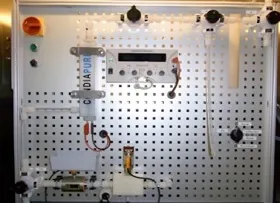NADINE – Nanomodified Diamond Electrodes for In-Line Disinfection Processes in Different Areas of Application

Water scarcity is one of the urgent problems in the 21st century and affects one of three persons on the globe. In this context, it is very important to seek for technologies capable of cleaning and eliminating persistent pollutants from water resources. The related environmental toll should be kept at a minimum, material and energetic costs should be reduced and the method has to be free of residues.
Diamond is an extremely hard and chemically inert material. By doping, it can be made conductive so that it keeps the properties of pure diamond and can be used to synthesise highly reactive species. When operated in water, it produces hydroxyl radicals, hydrogen peroxide and ozone directly from water molecules, no added chemicals required. These oxidants are highly active and able to attack even persistent organic molecules.
The objective of the project is to compare the effectiveness of the diamond electrode at degrading pollutants in wastewaters with established technologies, namely AOPs – advanced oxidation processes. The combination of UV-radiation and hydrogen peroxide as well as the Fenton reaction should be studied. The emphasis is set on the analysis of the degradation products. In other words, it should be found out if the different processes trigger identical oxidation mechanisms with the same chemical intermediates or not.
A further key point is the disinfection efficiency of the diamond electrode. If these electrodes are able to inactivate bacteria and germs in a cost-effective way, they could soon be implemented in sewage treatment plants, the food industry, medicine, and everywhere, where water gets recycled.
A further key point is the disinfection efficiency of the diamond electrode. If these electrodes are able to inactivate bacteria and germs in a cost-effective way, they could soon be implemented in sewage treatment plants, the food industry, medicine, and everywhere, where water gets recycled.
| Project Leader | PD Dr. rer. nat. habil. Brigitte Helmreich |
| Researcher | Dr. rer. nat. Mateo Ureña de Vivanco, Mohamad Rajab, M.Sc. |
| Funding | Bundesministerium für Bildung und Forschung (BMBF) |